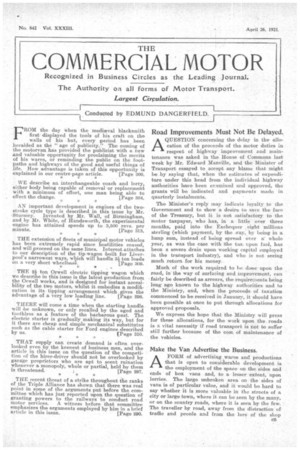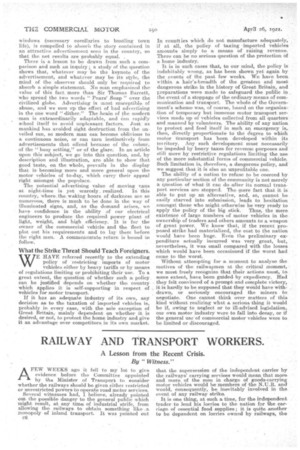F ROM the day when the meslizeval blacksmith first displayed the
Page 1

Page 2

If you've noticed an error in this article please click here to report it so we can fix it.
tools of his craft. on the walls of his hut, every period has been heralded as the " age of publicity.' The coming of the motorvan has provided the publicist with a new and valuable opportunity for proclaiming the merits of his wares, or reminding the, public on the footpaths and highways of the good and useful things of life. How advantage is taken of this opportunity is explained in our centre-page article. [Page 300.
WE describe an interchangeable coach and lorry, either body being capable of removal or replacement with aminimum of effort, one man being able to effect the change. [Page 304.
AN important development in engines of the twostroke cycle type is described in this issue by Mr. • Sturrney. Invented by Mr. Wall, of Birmingham, and by Mr. White, of Handsworth, the experimental engine has attained speeds up to 3,500 revs, per minute. [Page 313.
THE extension of fleets of municipal motor vehicles has been extremely rapid since hostilities ceased, and will proceed on the same lines. Interest attaches to our description of the tip-wagon built for Liver-. pool's narrowest ways, which will handle 3i ton loads on a very short wheelbase. [Page 309.
THE 2i ton Orwell electric tipping wagon which we describe in this issue is the latest production from the Orwell works, and is designed for instant accesibility of the two motors, whilst it embodies a modification in its tipping arrangement which gives the advantage of a very low loading line. [Page 298.
THERE will come a time when the starting handle will be unknown, or only recalled by the aged and toothless as i feature of the barbarous past. The electric starter is gradually making its way, but for it there are cheap and simple mechanical substitutes such as the cable starter for Ford engines described by us. * * [Page 310. :1.
THAT supply can. create demand is often overlooked even -by the keenest of business men, and the article in this issue on the question of the competition of the hirer-driver should not be overlooked by garage -proprietors who are apt to scent ruination whenever a monopoly, whole or partial, held by them is threatened. 1 * [Page 297. s * THE recent threat of a strike throughout the ranks of the Triple Alliance has shown that there was real point in some of the arguments put before the committee which has just reported upon the question of granting powers to the railways to conduct road motor services. A witness before that committee emphasizes the, arguments employed by him in a brief article in this issue. , [Page 290.
Road Improvements Must Not Be Delayed.
QUESTION concerning the delay in the allo cation of the proceeds of the motor duties in respect of highway improvement and maintenance was asked in the House of. Commons last week by Mr. Edward Manville, and the Minister of Transport essayed to accept any blame that might be by saying that, when the estimates of expenditure under this head from the individual highway authorities have been examined and approved, the grants will be indicated and payments made in quarterly instalments.
The Minister's reply may indicate loyalty to the Governme.nt and to show a desire to save the face of the Treasury, but it is not satisfactory to the motor taxpayer, who has, in a little over three months, paid into the Exchequer eight millions sterling (which payment, by the way, ..by being in a lump sum, instead of being spread over awhole year, as was the case with the tax. upon fuel, has been a severe drain upon. working capital employed in the transport industry), and who is not seeing much return for his money.
Much of the work required to be done -upon the road, in the way of surfacing and improvement, can fairly be described as arrears, the requirements being long ago known to the highway authorities and to the Ministry, and, When the proceedsof taXatiou commenced to be received in January, it should have been possible at once to put through allocations for approved proposals.
We express the hope that the Minigtry will press for these allocations, for the work upon the roads is a vital necessity if road transport is not to suffer still further because of the cost. of maintenance of the vehicles.
Make the Van Advertise the Business.
FORM of advertising wares and productions that is open to considerable development is the employment of the space on the sides and ends of box vans and, to a. lesser extent, upon lorries. The large unbroken area on the sides of vans is of particular value, and it would be hard to say whether it is more valuable in the streets of a city or large town, where it can be seen by the many, or on the country roads, where it is seen by the few. The traveller by road, away from the distraction of traffic and peonle and from the lure of the shop 05 windows (necessary corollaries to bustling town life), is compelled to absorb the story contained in an attractive advertisement seen in the country, so that the net results are probably equal. , There is a lesson to be drawn from such a comparison and such an inquiry 5 a study of the question shows that, whatever may be the keynote of the advertisement, and whatever may be its style, the mind of the observer should only be required to absorb a simple statement. No man emphasized the value of this fact, more than Sir Thomas Barrett, who spread the two words " Pears'.Soap " over the civilized globe. Advertising is most susceptible of abuse, and we sum up the effect of bad advertising in the one word " dither." The brain of the modern ,man is extraordinarily adaptable, and can rapidly school itself to avoid unpleasant factors. Just as mankind has avoided sight destruction from the unveiled sun, so modern man can become oblivious to a continuous noise, or can turn instinctively from advertisements that offend because of tie colour, of the "busy setting," or of the glare: In an article upon this subject, we go into this question, and, by description and illustration, are able to show that good taste, on the whole, .prevails in the display that is becoming more and more general upon the motor vehicles of to-day, which carry their appeal right &ma/1ga the populace.
The potential advertising value, of moving vans
at night-time is yet. scarcely, realized. In this country, where.the, waking hours of darkness are so numerous, there is much to be done in the way of illuminated signs, and, as the demand arises, we have confidence in the ability of our electrical engineers to produce the required power plant of light, weight, and high efficiency. It is for the owner of the commercial vehicle and the fleet to plot out hi a requirements and to lay them before the right men. A commensurate return is bound to follow.
What the Strike Threat Should Teach Foreigners
WE HAVE referred recently to the extending policy of restricting. imports of motor vehielea either by heavy tariffs or by means of regulations limiting or prohibiting their use. To a great extent, the question of whether such a policy can be justified depends on whether the country which applies, it is self-supportingin respect of vehicles for motor transport. If it has an adequate industry of its own, anY decision as to the taxation of imported vehicles is, probably in every case, with the sole exception of Great Britain, mainly dependent on whether it is desired, or not, to protect the home industry and give it an advantage over competitors. in its own market.
In counttles which do not manufacture adequately, if at all, the policy of taxing •imported vehicles amounts simply to a means of raising revenue. There can be no serious question of the protection of a home industry.
It is in such cases that, to our mind, the policy is indubitably wrong, as has been shown yet again by the events of the past few weeks. We have been. within a hair's-breadth of the greatest and most dangerous strike in the history of Great Britain, and preparations were made to safeguard the puBlic in the event of a stoppage of the ordinary means of communication and transport. The whole of the, Government's scheme war, of course, based on the organization of temporary but immense motor transport services made up of vehicles Collected from all quarters and manned by volunteers. The ability of any nation to protect and feed itself in such an emergency is, then, directly proportionate tb. the degree, to which motor -transport has been developed within its territory. Any such development must necessarily be impeded by heavy taxes for revenue purposes and still snore by restrictive regulations limiting the use of the more substantial forms of commercial vehicle. Such limitation is, therefore, a dangerous policy, and we suggest that it is also an unprofitable one.
The ability of a nation to refuse to be coerced by any particular section of the community is not merely a question of what it can do after its normal traasport services are stepped. The an.ere fact that it is able to put up an alternative, and, so, cannot be easily starved into submission, leads to hesitation amongst, those who might otherwise be very ready to apply the policy of the big stick. Thus, the mere. existence of large numbers of motor vehicles in the ownership of traders and others amounts to a weapon of great power. We know that, if the recent proposed strike had materialized, the cost to the nation would have been huge. Even the preliminary expenditure actually incurred. was very great, but, nevertheless, it was small compared with the losses which would have been occasioned if the worst had come to the worst.
Without attempting for .a moment to analyse the motives of the railwaymen at the critical moment, we must freely recognize that their actions must, to some extent, have been guided by expediency. Had they felt convinced of a prompt and complete victory, it is hardly to be supposed that they would have withdrawn, or seriously encouraged the miners to negotiate. One cannot think over matters of this kind without realizing what a serious thing it would be if, owing to neglect or to ill-advised legislation, our own motor industry were to fall into decay, or if the general use' of commercial motor vehicles were to be limited or discouraged.
































